Arka Ghosh
Seeking Late Night Life Lines: Experiences of Conversational AI Use in Mental Health Crisis
Dec 29, 2025Abstract:Online, people often recount their experiences turning to conversational AI agents (e.g., ChatGPT, Claude, Copilot) for mental health support -- going so far as to replace their therapists. These anecdotes suggest that AI agents have great potential to offer accessible mental health support. However, it's unclear how to meet this potential in extreme mental health crisis use cases. In this work, we explore the first-person experience of turning to a conversational AI agent in a mental health crisis. From a testimonial survey (n = 53) of lived experiences, we find that people use AI agents to fill the in-between spaces of human support; they turn to AI due to lack of access to mental health professionals or fears of burdening others. At the same time, our interviews with mental health experts (n = 16) suggest that human-human connection is an essential positive action when managing a mental health crisis. Using the stages of change model, our results suggest that a responsible AI crisis intervention is one that increases the user's preparedness to take a positive action while de-escalating any intended negative action. We discuss the implications of designing conversational AI agents as bridges towards human-human connection rather than ends in themselves.
Fair Differentially Private Federated Learning Framework
May 23, 2023Abstract:Federated learning (FL) is a distributed machine learning strategy that enables participants to collaborate and train a shared model without sharing their individual datasets. Privacy and fairness are crucial considerations in FL. While FL promotes privacy by minimizing the amount of user data stored on central servers, it still poses privacy risks that need to be addressed. Industry standards such as differential privacy, secure multi-party computation, homomorphic encryption, and secure aggregation protocols are followed to ensure privacy in FL. Fairness is also a critical issue in FL, as models can inherit biases present in local datasets, leading to unfair predictions. Balancing privacy and fairness in FL is a challenge, as privacy requires protecting user data while fairness requires representative training data. This paper presents a "Fair Differentially Private Federated Learning Framework" that addresses the challenges of generating a fair global model without validation data and creating a globally private differential model. The framework employs clipping techniques for biased model updates and Gaussian mechanisms for differential privacy. The paper also reviews related works on privacy and fairness in FL, highlighting recent advancements and approaches to mitigate bias and ensure privacy. Achieving privacy and fairness in FL requires careful consideration of specific contexts and requirements, taking into account the latest developments in industry standards and techniques.
Solvability of orbit-finite systems of linear equations
Jan 22, 2022Abstract:We study orbit-finite systems of linear equations, in the setting of sets with atoms. Our principal contribution is a decision procedure for solvability of such systems. The procedure works for every field (and even commutative ring) under mild effectiveness assumptions, and reduces a given orbit-finite system to a number of finite ones: exponentially many in general, but polynomially many when atom dimension of input systems is fixed. Towards obtaining the procedure we push further the theory of vector spaces generated by orbit-finite sets, and show that each such vector space admits an orbit-finite basis. This fundamental property is a key tool in our development, but should be also of wider interest.
One Sparse Perturbation to Fool them All, almost Always!
Apr 30, 2020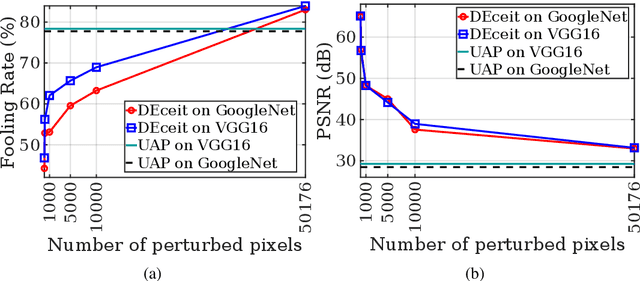
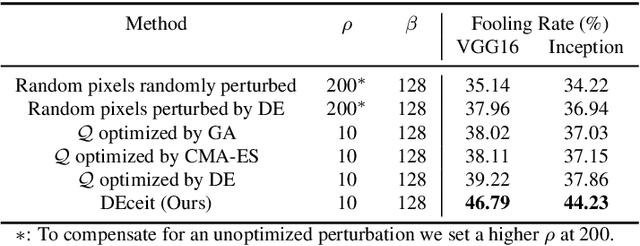

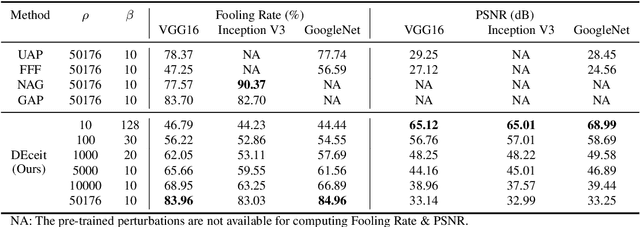
Abstract:Constructing adversarial perturbations for deep neural networks is an important direction of research. Crafting image-dependent adversarial perturbations using white-box feedback has hitherto been the norm for such adversarial attacks. However, black-box attacks are much more practical for real-world applications. Universal perturbations applicable across multiple images are gaining popularity due to their innate generalizability. There have also been efforts to restrict the perturbations to a few pixels in the image. This helps to retain visual similarity with the original images making such attacks hard to detect. This paper marks an important step which combines all these directions of research. We propose the DEceit algorithm for constructing effective universal pixel-restricted perturbations using only black-box feedback from the target network. We conduct empirical investigations using the ImageNet validation set on the state-of-the-art deep neural classifiers by varying the number of pixels to be perturbed from a meagre 10 pixels to as high as all pixels in the image. We find that perturbing only about 10% of the pixels in an image using DEceit achieves a commendable and highly transferable Fooling Rate while retaining the visual quality. We further demonstrate that DEceit can be successfully applied to image dependent attacks as well. In both sets of experiments, we outperformed several state-of-the-art methods.
Hybrid Optimized Back propagation Learning Algorithm For Multi-layer Perceptron
Dec 08, 2012Abstract:Standard neural network based on general back propagation learning using delta method or gradient descent method has some great faults like poor optimization of error-weight objective function, low learning rate, instability .This paper introduces a hybrid supervised back propagation learning algorithm which uses trust-region method of unconstrained optimization of the error objective function by using quasi-newton method .This optimization leads to more accurate weight update system for minimizing the learning error during learning phase of multi-layer perceptron.[13][14][15] In this paper augmented line search is used for finding points which satisfies Wolfe condition. In this paper, This hybrid back propagation algorithm has strong global convergence properties & is robust & efficient in practice.
* Accepted for publish in 18th December, 2012,International Journal of Computer Applications, Foundation of Computer Science, New York, USA
Comparative study of Financial Time Series Prediction by Artificial Neural Network with Gradient Descent Learning
Jan 31, 2012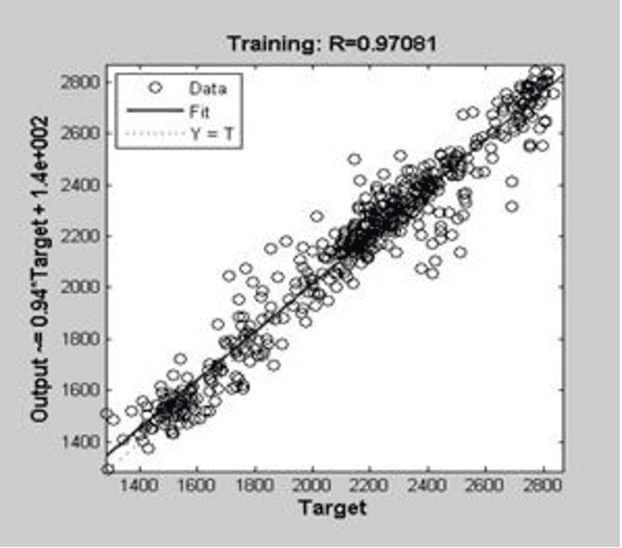
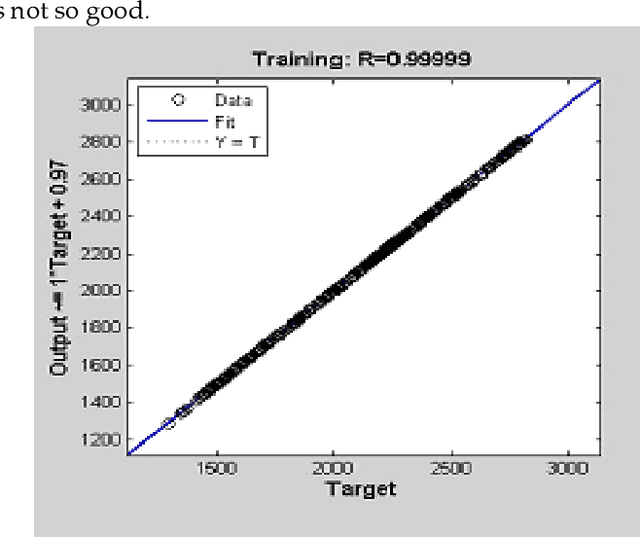
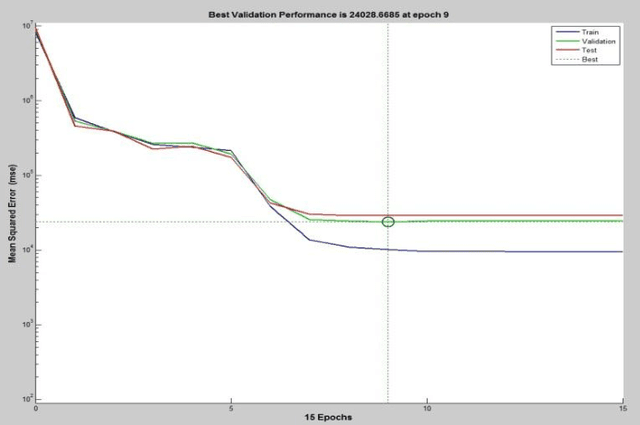
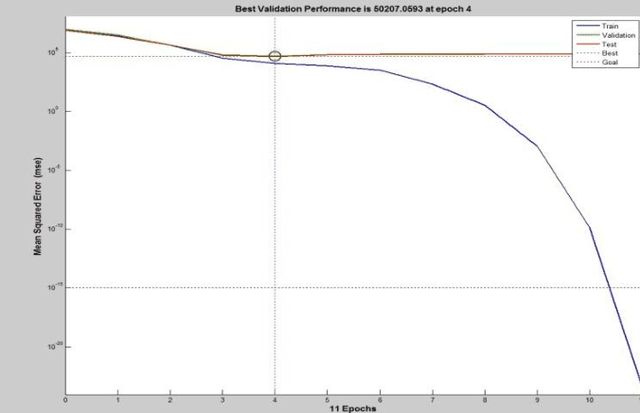
Abstract:Financial forecasting is an example of a signal processing problem which is challenging due to Small sample sizes, high noise, non-stationarity, and non-linearity,but fast forecasting of stock market price is very important for strategic business planning.Present study is aimed to develop a comparative predictive model with Feedforward Multilayer Artificial Neural Network & Recurrent Time Delay Neural Network for the Financial Timeseries Prediction.This study is developed with the help of historical stockprice dataset made available by GoogleFinance.To develop this prediction model Backpropagation method with Gradient Descent learning has been implemented.Finally the Neural Net, learned with said algorithm is found to be skillful predictor for non-stationary noisy Financial Timeseries.
 Add to Chrome
Add to Chrome Add to Firefox
Add to Firefox Add to Edge
Add to Edge